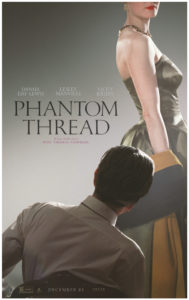Phantom Thread
Posted on January 11, 2018 at 5:49 pm
D| Lowest Recommended Age: | Mature High Schooler |
| MPAA Rating: | Rated R for language |
| Profanity: | Strong language |
| Alcohol/ Drugs: | Alcohol, cigarettes |
| Violence/ Scariness: | Poison |
| Diversity Issues: | None |
| Date Released to Theaters: | December 22, 2017 |
| Date Released to DVD: | April 10, 2018 |

Paul Thomas Anderson’s “Phantom Thread” is the story of a selfish, headstrong haute couture designer who likes to leave small, secret, embroidered messages concealed within the lining of his meticulously constructed gowns. If Anderson has left a message within the lining of this meticulously constructed, exquisitely performed, but ultimately self-indulgent and morally vacant film, it is better kept secret.
There is so much potential here. The relationship between the designer and the women who make, model, and wear the gowns brims with intriguing concepts about who is in service to whom. Clothing is art, commerce, and self-expression and it is also practical. It has to fit when one stands, sits, and walks, to protect us from the elements while it defines us and tells the world who we are and at the same time who the designer is as well. Not much of that is explored here, any more than the philosophy side of the charismatic leader played by Philip Seymour Hoffman in Anderson’s “The Master” was. Like that film, this is about the drive of the central character more than the motives or ideas. And so, in a story about a man driven by the impulse to create, it is curiously empty about what it is to have or to struggle with a creative vision. We see more of the designer’s inner life in his jealous reaction to a customer who is buying dresses elsewhere and his irritated reaction to toast being buttered too loudly.
The designer is Reynolds Woodcock, played by Daniel Day-Lewis in what he says is his final role, and reportedly inspired by the European designers of the 1950’s, before designer ready-to-wear began to take over the market. The opening scenes, as a fleet of impeccably smocked seamstresses arrive in the elegant London townhouse that serves as his home, studio, and showroom, is breathtakingly staged and kaleidoscopically entrancing.
We see that Woodcock tires easily of his live-in lady friends, and that it is his omni-capable sister Cyril (a gorgeous performance by the always-brilliant Lesley Manville) who not unkindly informs this latest in what appears to be an endless line rotating in and out that her services are no longer required. Woodcock visits the country where a waitress named Alma (Luxembourg actress Vicky Krieps) catches his attention. Soon he is literally taking her measure, fitting a gown to her, and she becomes the next lady to rotate in. She has no intention of rotating out.
Like Elizabeth Taylor with Mercedes McCambridge in “Giant” and Joan Fontaine with Judith Anderson in “Rebecca,” Krieps plays a young, innocent woman who comes into a grand house with a mysterious, imperious, magnetic, and wealthy man only to find that there is already in the house a woman in charge. The dynamic between them would have made a better movie. Instead, we are alerted in a foreshadowing scene as it begins that this is about the relationship between Alma and Woodcock. She says to someone we cannot yet identify, “Reynolds has made my dreams come true. And I have given him what he desires most in return, every piece of me.”
It’s a more literate, better acted, more tastefully presented version of “Fifty Shades of Gray,” all lush settings and “the sub is truly the dom” dynamics. Without some understanding or or even some representation of Woodcock’s aesthetic vision or what creating means to him, he is just a narcissistic diva who adores being adored. The nutso ending really sends it over the cliff.
Day-Lewis is extraordinary, of course. No one commits more fully to a character. It is mesmerizing to see the way he brushes his hair and pulls up his socks, the mercurial shifts from being overwhelmed by having other people near him to a visceral need for attention. Manville’s Cyril is shrewd but not unsympathetic to the people she has to finesse. And Krieps is fine as Alma, who wants to please Woodcock but despite the “every piece of me” line, she wants it the way she wants, not necessarily the way he wants. Like “mother!” though, this is a movie by a self-conscious auteur about how the tortured existence necessary for creation depends on the willingness of devoted, uncomplicated, lissome females that cannot even make a case for the value of the art. If there is a hidden message in the lining, it is just: “Me.”
Parents should know that this film includes some very strong language, sexual references, and very risky behavior with some harm.
Family discussion: Why did Reynolds approve of what Alma was doing? What did Cyril and Alma think about each other? What did Alma mean about “giving him all of myself?”
If you like this, try; “Magnolia” and “There Will Be Blood”
